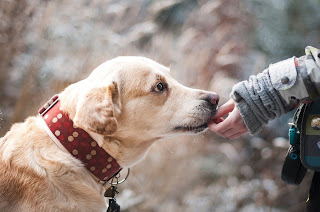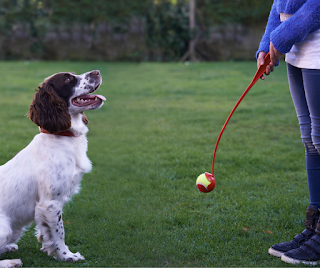Skip to main content
7 Great Reasons You Should Teach Your Dog Co-operative Care
7 Great Reasons You Should Teach Your Dog Co-operative Care
What Is Co-operative Care?
Co-operative care is the name given to training that aims to not only allow your dog to tolerate husbandry procedures and handling, but it also teaches them to give their consent to let it happen. This essentially gives your dog a choice to stop something from happening if they feel anxious or stressed by it. Most commonly, grooming, bathing and veterinary care are the centre of this training.
You may have seen captive wild animals in zoos such as tigers and elephants being taught to offer their limbs consensually so that they can receive blood tests. Similarly monkeys are often taught to hold their mouths open to receive oral medications. This begs the question as to why it is not more common place for us to teach our dogs in the same way? If animals as big and powerful as an elephant can receive routine veterinary treatment, without any physical restraint, then surely that means our dogs are more than capable of doing the same without being man-handled or forced into it.
Co-operative care is growing in popularity which is great news for our canine companions, but in case you are still not sure if you should try teaching your own dog, then here are 7 great reasons to give it a go!
1. It Helps Your Dog To Cope Better
The whole aim of co-operative care is to make sure that your dog knows what is happening at all times and to ensure they have the option to make it stop if they are uncomfortable. For example you can teach your dog to willingly offer their front legs in the same way they would if a blood sample was being taken. In doing so, this prepares them for this process in the future as it will already be familiar to them. Chances are, if the situation feels familiar to them, then they are much more likely to cope with it better than if they are forced into it without warning.
2. It Reduces Their Stress Levels
By preparing your dog for potential future situations, you will in turn reduce their stress levels when they experience them 'for real.' As we all know, a trip to the vets is stereotypically stressful for our dogs, so anything we can do to reduce this stress for them has got to be a great idea.
If your dog is already used to being handled and examined by you at home, this makes it more likely for them to tolerate this when it is done in a different environment by a different person such as at the vets. This lessens the need for physical restraint which again if often very stressful for our dogs, especially when it is carried out by a stranger to them.3. It Sets Them Up For Success
Those of you who know me well, know I am all about setting our dogs up for success whenever possible! By providing them with the tools to effectively cope with grooming and veterinary examinations and procedures, as well as the ability to pause them if they are uncomfortable, is a recipe for success. Dogs that are taught co-operative care skills are much more likely to have these procedures carried out successfully than those who are forced or coerced into cooperating.
4. It Keeps Them In Optimal Health
There will undoubtedly be times in your dog's life where they need to be brushed, bathed, have their nails clipped, have their teeth brushed or be examined by a vet. Teaching them to be willing participants in all of these tasks makes it much easier to spot any health issues earlier, but also increases the chances of treatments being more effective. For example, if you teach your dog to swallow tablets, by using blank tablets, then they are already used to this process. Then, if the situation arises where they need tablets to treat an illness, they already have the experience of doing so effectively.
5. It Makes Your Life Easier
Tasks such as brushing or nail trims can be just as stressful for you as an owner, as it is for your dog. By setting your dog up for success and giving them the coping mechanisms required for these tasks to be executed effectively, will reduce the stress involved for both of you. Our dog's simply do not understand the importance of having their nails trimmed, or them being brushed, despite how much we need to do this. Nobody really wants to physically restrain their dog or feel their frustrations building just to get a seemingly simple task done. This can all be avoided by teaching your dog co-operative care techniques.
6. It Builds Trust Between You
By giving your dog the ability to stop you doing something they find uncomfortable, this rapidly builds the trust they share with you. Alongside this, as co-operative care reduces the need for physical restraint, this also builds trust too. For example, if your dog is happy for you to trim their nails calmly and they then receive a high value reward for doing so, they are likely to trust you to do this again. However, if have to restrain them using force and carry on with the nail trimming despite their fears and anxiety, it will make them even less likely to trust you to do it again in the future.
7. It Increases Your Dog's Confidence
Increasing the choices your dog can make always increases their confidence. Dogs who are forced into uncomfortable or frightening situations are likely to either shut down through extreme fear, or lash out aggressively to make the situation stop. I am sure none of us would knowingly want our dogs to feel trapped in this way. Instead, if you respect that your dog has withdrawn consent and you then stop the process, this will increase their confidence. More choice = More confidence.
For more information on setting your dog up for success and positive reinforcement training, take a look at my book Canine Contentment - The Essential Guide








Comments
Post a Comment